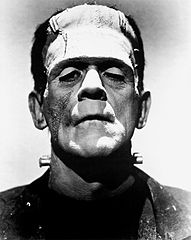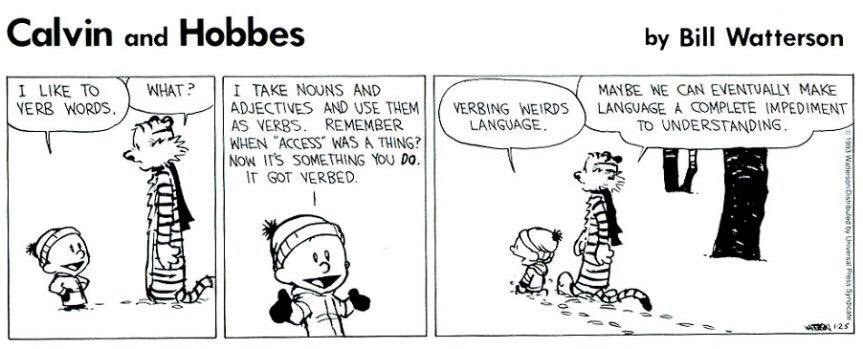It's a figure of speech, known as anthimeria: the use of a word in a part of speech other than its customary usage.*
Ordinarily, Frankenstein is a proper noun referring to a fictional monster originally from the 1818 novel Frankenstein by Mary Shelley and later made into numerous horror movies, most famously a 1931 movie starring Boris Karloff. The movie version is the best known: a monster created by stitching together body parts gathered from several corpses and brought to life by zapping it with electricity. The Frankenstein monster is usually portrayed as an ugly mess, with the stitches visible, green skin, a lumbering walk, and bolts sticking out of his neck.

Boris Karloff as the Frankenstein monster
Mark Kellerman's figure of speech draws an analogy between the Lakers and the Frankenstein monster: both were "stitched together" from parts (basketball players or body parts) that don't fit together well. There is no implication that the players are individually great. The Lakers and Frankenstein lack the organic unity normally found in a smoothly functioning team or a living organism. Notice that in Kellerman's next sentence, he elaborates on the idea of unrelated parts stitched together: "It took so much to get the big parts together, to get the details right around them is going to take another year of figuring it out…"
More questions answered
There is no need for the noun "Frankenstein" to already have an abstracted meaning close to that of the figurative verb. With figures of speech, the only limits are what analogies you hope your listeners can follow. If "Frankenstein" as a verb made only a tiny jump from the meaning of the noun, it wouldn't be punchy. The power of figurative language derives from the leap that a listener must make to understand it. Evoking the specific, concrete story and image is what makes this figure of speech so pungent. The story includes notions like digging up bodies from a graveyard and a mad scientist trying to force life into them with an artificial electric jolt. These details influence how the listener interprets the figure of speech—that is, how the listener is led to view the Lakers. A generalized abstraction would lack the color and emotional resonance that those concrete details provide.
Yes, you can make this figure of speech with most fluent English speakers and expect to be understood without any explanation—even though it's surprising and unusual. The Frankenstein monster is a very well known cultural landmark. The picture above is iconic; the word Frankenstein brings it to mind. Frankenstein is even a standard Halloween costume for children.
The reason you don't see Frankenstein listed as a verb in dictionaries is because people have only seldom used it as a verb. Occasionally a figure of speech becomes common enough that dictionaries record it. That's how the Cambridge and Collins definitions that you found reached those dictionaries. When a figure of speech becomes common enough to reach a dictionary, it's no longer surprising. Sometimes a figure of speech becomes so commonplace that people no longer even understand it as a jump in meaning from the original usage. But both of those are rare. Most figures of speech are invented for a single occasion and never used again.
More examples
Anthimeria is common in English, especially the use of a noun as a verb, often called "verbing" a noun (an instance of itself). It's especially popular in advertising. Here are a few more examples:
Unlock your more. (An advertising slogan that uses an adverb as a noun.)
Come TV with us. (Another noun used as a verb.)
He recycled this gift! He's a regifter! (From an episode of Seinfeld. A noun used implicitly as a verb used implicitly to make another verb ("regift") used to make a noun for someone who does the verb. This all happens in one leap and no one has difficulty following it.)
Listen to this. Marzy comes over and tells me that her ex-boyfriend was over late last night, and "yada yada yada, I'm really tired today." You don't think she'd yada yada sex? (Also from an episode of Seinfeld. This (famously) uses nonsense filler syllables as a verb.)
* But you should know that "anthimeria" is an obscure word. Few fluent speakers have even heard of it.


